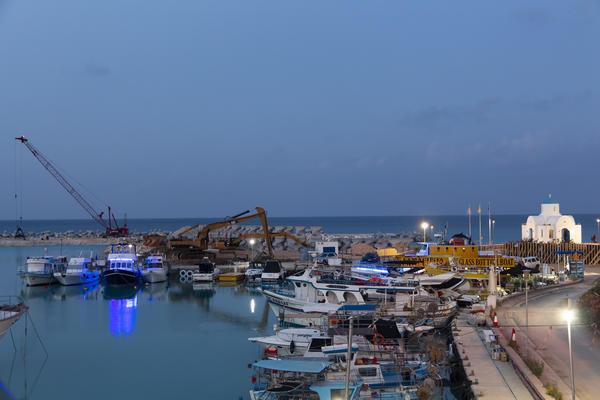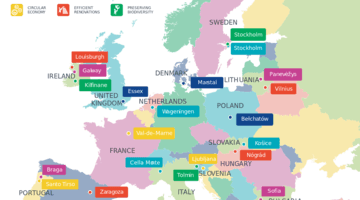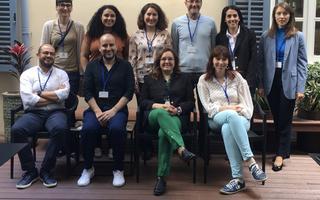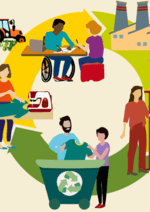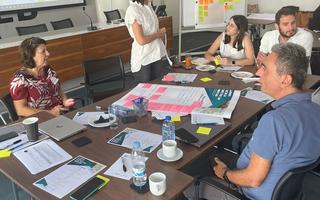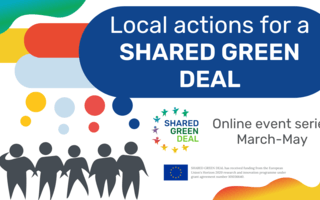Importance of standardisation towards the circular economy in Cyprus
The social experiment will focus on sustainability and circularity in the Construction and Building sector. It will establish a Local Accelerator Hub (LAH), gathering relevant stakeholders to share knowledge about good practices in the sector and improve their visibility and applicability throughout the industry and market and furthermore, develop common local circular business solutions. The experiment is an opportunity to change the current mindset regarding circular products, educate stakeholders in the construction sector and increase the general public's awareness and confidence in the quality of recycled materials from construction and demolition.
Good practices, challenges, and business solutions demonstrated through the experiment will be the basis for developing a roadmap for implementing circular economy business models and policy, standardisation, and certification recommendations to support the successful transition to the circular economy in the country.
Local context
The construction sector has always been one of the major industries in Cyprus, creating great opportunities for many stakeholders, but at the same time, Construction and Demolition Waste (CDW) has created major environmental challenges.
Due to the limited area of the island and the dependence on imports of products, Cyprus faces challenges in implementing a circular economy. Moreover, the general lack of skills and knowledge to organise effective systems of CDW management is also an important issue.
At present, there is no direct legal or policy framework for the circular economy in Cyprus. Furthermore, there are no legal requirements to apply sustainability and circular economy aspects through the building life cycle.
The three largest cities of the island will be involved in the social experiment: Nicosia, Limassol, and Larnaca, with different geographical characteristics; nevertheless, due to the small size of the island, its entire territory is considered within the scope of this social experiment.
Specific needs and challenges
The construction industry's high activity intensity causes a high CDW generation rate, while the island's limited natural resources require sustainable management to safeguard the natural habitat.
The awareness level of stakeholders in the construction industry regarding the impacts of their activity is inadequate; therefore, stakeholders need to be trained and educated. Furthermore, construction industry stakeholders are not adequately connected and engaged in exchanging knowledge and expertise regarding sustainable practices. This indicates the need for strengthening stakeholder engagement.
Additionally, the knowledge acquired from academia, engineers, industry, and environmental NGOs is inefficiently disseminated among stakeholders to implement the best available circular practices and techniques.
Furthermore, equal gender representation in the experiment will be challenging owing to the gender inequalities inherent to the construction industry.
Detailed description of the experiment
The social experiment will start with an informal meeting to identify existing good practices and research programs related to circular practices in the construction sector. These can include industry manufacturers who include circular economy through their process for the development of circular construction products; companies that deal with the management of construction and demolition waste; designers and architecture firms that have incorporated the concept of circular building design in their projects; academic research projects that deal with Circular Economy; start-up companies etc. This meeting will prepare the ground for the experiment by inviting local businesses to register to the LAH.
The primary goal of the first workshop is "Let's Talk Circular." It will bring together local businesses and research centres, sharing and exchanging ideas and experiences, reporting state-of-the-art use cases and in-progress good practices and defining the local challenge. Also, we envisage distributing a questionnaire to the participants for a preliminary assessment regarding their knowledge about circular business models and CE to better identify and map local challenges in the sector.
The second workshop will use the Design Thinking process to encourage creative problem-solving by developing common circular business solutions in different interrelated aspects of the construction sector: circular design of the building environment, circular thinking for construction waste, and circular production of construction products.
The third workshop will involve consumers in addition to previously involved stakeholders. The purpose is to demonstrate the circular business solutions created during the second workshop, test for errors or omissions, and assess how and why the solutions meet or fail to meet consumers' needs. The disabled community will provide feedback to support inclusive circular solutions. The purpose is for businesses to improve the circular solutions based on consumers' feedback.
The businesses registered to the LAH will be requested to present the solutions proposed during the circular business award ceremony that will recognize cooperation, innovation, and best circular ideas.
Local engagement
Improving communication between industry and research is one of the main goals to maximize the use of the research results to challenge the industry to apply circular economy principles. Academic partners will provide the knowledge acquired by the ongoing research on circular construction products and work with the sector implementing innovative pilots and test their feasibility.
ENGOs are a significant interested party in the context of environmental impacts of the construction sector, which can contribute by providing expertise to select the most sustainable and circular practices.
It is also essential to involve consumers and end users, including vulnerable groups such as persons with disabilities, who should have the opportunity for an equal participation in standardization activities. Hence, the goods and services are accessible to a wide diversity of users. It is important to note that accessibility is a key objective of the European standardization system. Various working groups have been formed to address accessibility in product and service standards. Additionally, the Design for All approach should be considered when developing new standardization projects.
Finally, the involvement of Public Authorities is crucial as they are responsible for adopting regulatory measures, policies, funding programs, and circular public procurement criteria to support the transition from a linear to a circular model.
Partners
Cyprus Employers and Industrialists Federation (OEΒ), which represents the business sector and industry, is an important partner to be considered. Furthermore, research and academic institutions, which develop and test new technologies for market uptake, will also be valuable partners. Moreover, professional associations like the Technical Engineering Chamber, representing the interests of the wider society of engineers and OSEOK- Cyprus Federation of Building Contractors Associations, can effectively support the experiment and promote a knowledge-sharing network.
It is essential to mention that CYS has established a close relationship through ongoing cooperation and a memorandum of understanding with the entities mentioned above and has worked closely together to operate the national standardization system. Furthermore, CYS maintains an extensive network of individual experts from the industry who can contribute with their knowledge and expertise to the successful development and operation of LAH.
Local businesses, current standardization projects, the national action plan, and research initiatives can benefit from the experiment results to access knowledge and interested parties.
Additional remarks
The LAH will be continuously updated after the end of the project to provide involved stakeholders with information on circular economy in construction and buildings, establishing CYS as a national focal point on the topic.
The results will be an important input for CYS to develop a roadmap with recommendations for standardization, action plans, and further collaboration.
Local partner
Cyprus Organisation for Standardisation (CYS)
Country
CYPRUS
Number of inhabitants
1,232,216
City
Nicosia, Larnaka, Limassol
Where the experiment is carried out
Nicosia, Larnaka, Limassol
Website/social media
Contact person:
Marios Mavroyiannos, Standards Officer
m [dot] mavroyiannos [at] cys [dot] org [dot] cy
Anna Dionysiou, Standards Officer
a [dot] dionysiou [at] cys [dot] org [dot] cy
Until End Aug 2023
Online Platform Development and Local Businesses Registration
Until end Sep 2023
Execution of 1st Workshop
Until end Nov 2023
Execution of 2nd Workshop
Until end Jan 2024
Execution of 3rd Workshop
Until end May 2024
Execution of Ceremony Award
Until end Jun 2024
Execution of Interviews and translation of transcripts
Related Green Deal Priorities
TIMELINE
Case Study Guides
|
Find out more


CONTACT
For further details please contact co-leads Professor Chris Foulds (chris.foulds@aru.ac.uk) and Professor Rosie Robison (rosie.robison@aru.ac.uk).

This project has received funding from the European Union’s Horizon 2020 research and innovation program under grant agreement No 101036640. The sole responsibility for the content of this website lies with the SHARED GREEN DEAL HAS project and does not necessarily reflect the opinion of the European Union.
